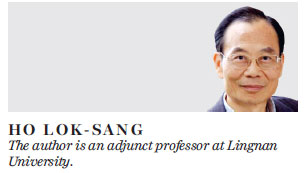Provide basic jobs, not basic incomes
Updated: 2016-06-14 07:49
By Ho Lok-sang(HK Edition)
|
|||||||
Ho Lok-sang says Hong Kong will be better served with a policy of 'basic jobs' to give every able-bodied person a basic income that is conditional on them working
On June 5, the Swiss voted in a referendum on whether or not they wanted to implement a universal basic income scheme. The proposal was for every Swiss to have a basic monthly income of 2,500 Swiss francs (about HK$20,000) for adults and 625 francs for children. Proponents argued that this would alleviate income disparity. Interestingly, the proposal was defeated by a wide margin. Some commentators remarked that this may have been due to the fact that most Swiss need to pay tax, which made them worry they might have ended up losing more than they gained.
It is true that under global capitalism almost every country has seen a widening of income disparity. Thomas Piketty's much discussed book Capital in the Twenty-First Century has documented the rise of income disparities over the years and has advocated an aggressive redistributive policy to correct it. Giving everybody a flat amount will alleviate income disparities, because this handout has to be financed by taxes, which will certainly mainly fall on those with high taxable incomes.

There is indeed a case for redistribution, and the SAR government's recent Low-income Working Family Allowance is an example. Another example is the public housing scheme, which is a transfer in kind. Still another example is Comprehensive Social Security Assistance. But an unconditional and big handout like that proposed in Switzerland would be a disaster. It is remarkable that the Swiss voted overwhelmingly against it. But in a society that lets public policy be decided by referendum, there is no guarantee that the next foolish policy will not get passed.
I have advocated for a "basic job" scheme rather than a basic income scheme. I had advocated for a wage subsidy that will supplement everybody's income and that is taxable, so that there will be an effective transfer from high-income earners to low-income earners. I was against Milton Friedman's negative income tax on the grounds that it is not conditional on people working. Transfers either should be conditional on work or conditional on some disability or unfortunate circumstance. An unconditional payment of 2,500 Swiss francs will discourage work, especially work that is unpleasant or monotonous. Who will do street cleaning and collect the garbage? Who will work as bus drivers? Who will take care of the elderly in homes for the aged?
While a basic income for every adult is certainly foolish and socially costly, a basic job makes eminent sense. I have been championing it for years. A description of the proposal can be found in Principles of Public Policy Practice, published in 2001 (Kluwer) and then in Public Policy and the Public Interest (Routledge, 2012). The idea is very simple. It will offer every able-bodied person the opportunity to work; those with disabilities will be given living allowances conditional on those disabilities. In the job market many people will have difficulty finding a job, and this is so even when the labor market is tight. They may include ex-convicts, those recovering from mental illnesses, people who may not have a pleasant appearance, young people without much experience, older people who may encounter some age discrimination, ethnic minorities with a handicap in language, etc. Since there are always socially productive jobs around, but not all socially productive jobs are commercially viable, we can employ these people productively and pay them a salary. They can help with work on improving public hygiene (fighting rodents, mosquitoes, and so on), clearing ditches so that they will not clog up during the rainy seasons, planting trees, patrolling our country parks and preventing forest fires, helping tourists with directions and other information, checking if our road signs can be improved, and many other things.
Basic jobs will give every able-bodied person a basic income that is conditional on work. In order to preserve work incentives, there needs to be some discipline. Those who do not put in a reasonable effort and are late or absent frequently can be dismissed. If one is dismissed there will have to be a waiting period in which one will not be paid. A second dismissal may warrant a longer waiting period. On the other hand, those who work conscientiously can get a pay increase or even a promotion, which will give them recognition for their good work. Basic jobs can be administered by a government department or by an authorized NGO.
There are many social benefits from a basic job scheme. First, it offers many disadvantaged people the opportunity to make a living and regain their self-esteem. Many studies have shown that unemployed people who keep failing to find jobs are under great mental stress. Second, it can help reduce our healthcare costs, to the extent that fewer people fall sick - either through infection or mental illness. Third, it may reduce crimes. Some people commit crimes because they fail to find an alternative way of making ends meet. Basic jobs give them the needed alternatives. Fourth, to the extent that fewer people are unemployed, there will be more social harmony and less social unrest. The business environment will be improved. Thus basic jobs may actually help generate other jobs in the economy to the extent that there may be more business investment.
(HK Edition 06/14/2016 page10)